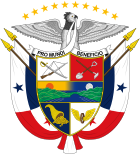This article has multiple issues. Please help improve it or discuss these issues on the talk page. (Learn how and when to remove these messages)
|
 |
|---|
The politics of Panama take place in a framework of a presidential representative democratic republic with multi-party system, whereby the President of Panama is both head of state and head of government.
Executive power is exercised by the president. Legislative power is vested in the National Assembly. The Judiciary is independent of the executive and the legislature. The branches are according to Panama's Political Constitution of 1972, reformed by the Actos Reformatorios of 1978 and the Acto Constitucional of 1983, united in cooperation and limited through a system of checks and balances.
Three independent organizations with clearly defined responsibilities are found in the constitution: the Comptroller General of the Republic has the responsibility to manage public funds; the Electoral Tribunal has the responsibility to guarantee liberty, transparency, and the efficacy of the popular vote; and the Ministry of the Public oversees interests of State and of the municipalities.
The USAID website ranks Panama at 0.83/1 for democracy, but only 0.5/1 for political corruption.[1]